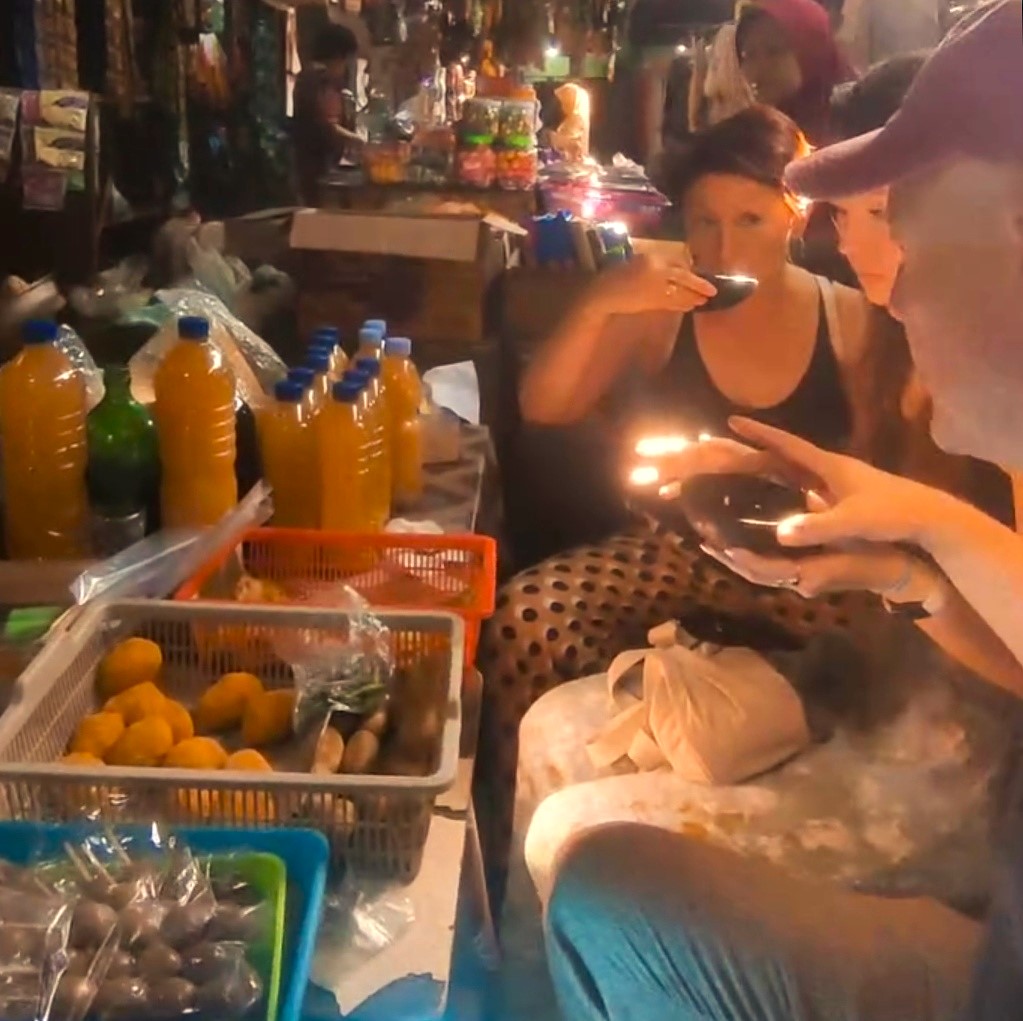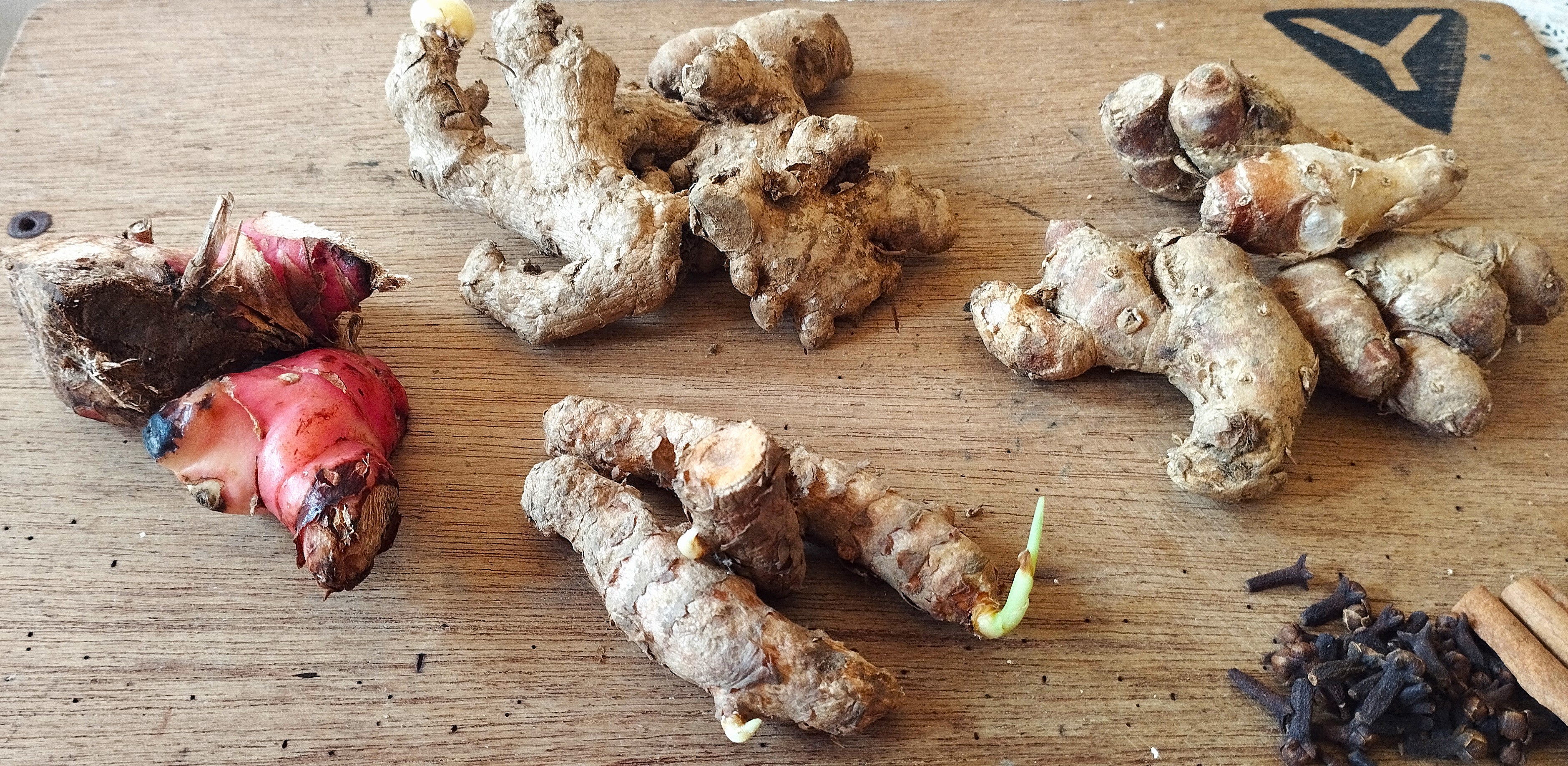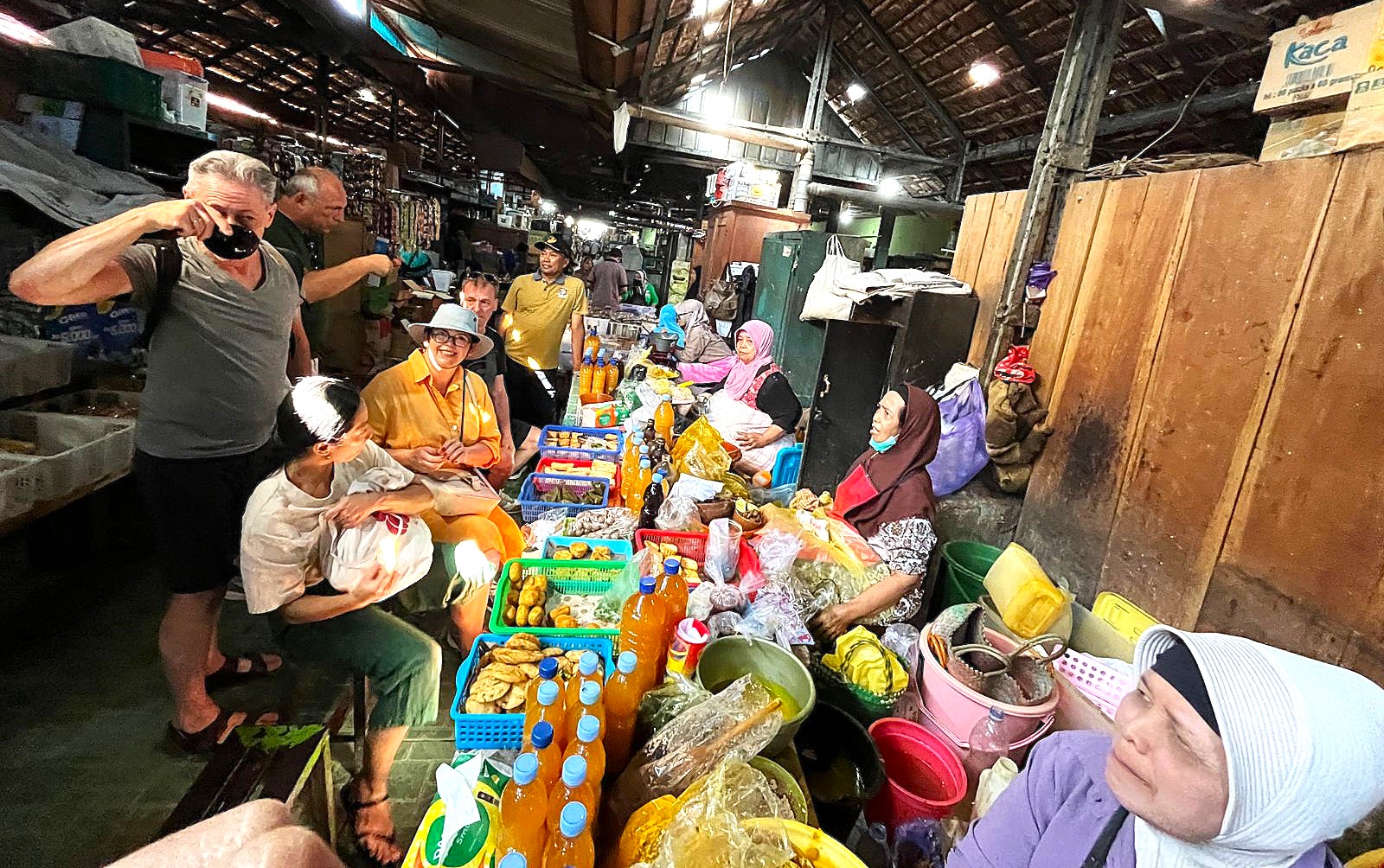
A Cup of Warmth Pasar Legi: Tracing the Javanese Jamu Tradition in the Heart of Kotagede
From the moment morning greets Kotagede, warmth fills the air among locals going about their daily activities as travelers begin their journey. The first destination is Pasar Legi, the vibrant heart where the morning pulse of the town begins to beat. Bustling yet welcoming. Along the narrow alleys between the vendors, slow travelers can discover a variety of traditional ingredients — from fresh vegetables and rice to local produce — all offered with genuine smiles.
This time, Sabato Kaliwuan invites travelers to stop by one of the most fascinating spots in the market: the stand of the traditional jamu (herbal medicine) sellers.
In a pristine corner of Pasar Legi in Kotagede, Yogyakarta, a living tradition continues through the skilled hands of the embok jamu (market ladies - affectionately called “embok”) who faithfully preserve their ancestral heritage. Unlike modern vendors who carry bottles of ready-to-drink herbal tonics, these emboks serve their jamu in a more authentic and personal way: freshly prepared right in front of their customers
Kencur (Kaempferia galanga), turmeric (Curcuma longa), ginger (Zingiber officinale), and temulawak (Curcuma xanthorrhiza)—the main ingredients of jamu—are pounded or grated traditionally, using simple tools that have been passed down through generations.
From their hands, the spices are carefully squeezed to extract the essence, which is then served according to the customer’s request. Everything is presented in small bowls made from coconut shells, a natural vessel that perfectly blends with the deeply traditional atmosphere.)

Because jamu often carries a bitter and pungent taste, the embok (market ladies, affectionately called “embok”) always include a special counterbalance: a small glass of refreshing tamarind drink “asam Jawa”. This drink not only shifts the flavor from bitter to a pleasant blend of sour and sweet, neutralizing and refreshing the palate, but also forms an essential part of the jamu drinking ritual. It enriches the experience and leaves a lasting impression on everyone who tastes it.
More than just a health drink, the making of jamu at Pasar Legi , a traditional market, is an experience that delights both the senses and the soul. International travelers visiting Kotagede often pause at the embok’s stalls, drawn by their warmth, genuine smiles, and the light-hearted stories they share while preparing the herbal concoctions. Amid the lively hum of the market and the timeless charm of Kotagede, these moments offer a refreshing pause—an intimate encounter with the humble yet heartfelt spirit of Javanese culture.
A Brief History of Traditional Jamu in the Indonesian Archipelago
Jamu is a cultural heritage of Indonesia that has existed for thousands of years, believed to date back to the era of ancient kingdoms such as Mataram Kuno and Majapahit. Written evidence of jamu can be found in inscriptions and temple reliefs, most notably at Borobudur Temple, which depict scenes of royal women preparing herbal concoctions.
In those times, jamu was not only used as a form of traditional medicine but also as part of bodily and spiritual care. The Javanese nobility believed that maintaining health and beauty was a way to honor both oneself and nature. Jamu recipes were passed down through generations, from mothers to their daughters, preserving a lineage of traditional wisdom and harmony with nature.
To this day, the tradition of drinking jamu continues to thrive across the Indonesian archipelago, including at Pasar Legi in Kotagede, where the embok (market ladies—affectionately called “embok”) faithfully prepare jamu the traditional way: without machines, without preservatives, using only their hands, wooden tools, and natural ingredients.
Here are some of the main jamu ingredients commonly used by the embok (market ladies—affectionately called “embok”) at Pasar Legi Kotagede, each with its own unique health benefits.

1. Kunyit (Curcuma longa)
Turmeric is known for its anti-inflammatory properties, helping to improve blood circulation, support digestion, and detoxify the liver. It is often made into Kunyit Asam (turmeric tamarind jamu), a popular herbal drink believed to relieve menstrual pain, maintain healthy skin, and boost stamina.
2. Kencur (Kaempferia galanga) helps warm the body, relieve coughs, and strengthen the immune system. In Javanese tradition, it is often mixed with rice to make Beras Kencur, a traditional Javanese rice and galangal herbal drink. Beras Kencur is popular among children and teenagers for boosting energy and maintaining vitality.
3. Jahe (Zingiber officinale)
Ginger is valued for its ability to alleviate colds, warm the body, reduce nausea and joint pain, and support the immune system. It is commonly served as Wedang Jahe (a traditional ginger infusion) or mixed into various other jamu recipes. Its warming and restorative properties make it perfect to drink during cold weather or when the body feels tired.
4. Temulawak (Curcuma xanthorrhiza)
Temulawak supports healthy digestion, stimulates appetite, and maintains liver function. Jamu Temulawak is often used to help treat stomach disorders and promote liver cell regeneration, making it a favorite tonic for restoring balance and vitality.
5. Asam Jawa (Tamarindus indica)
Tamarind serves as a natural taste neutralizer, helping to refresh the palate, aid digestion, and provide antioxidants. It is commonly mixed into Kunyit Asam (turmeric tamarind jamu), offering a pleasant, tangy aftertaste that refreshes the body and aids detoxification after drinking more bitter jamu varieties.
Jamu is more than just a health drink; it is a reflection of the Javanese philosophy of life: living in harmony with nature, maintaining bodily balance, and nurturing the soul.
It’s no wonder that international travelers visiting Pasar Legi, Kotagede, don’t just taste the richness and healing benefits of jamu, they also experience a warm and authentic expression of Javanese culture.

Tag: accomodation, architecture, architecturelovers, bicycle, bike, community, cooking, culinary, culturalexplorer, culturalwarmth, culture, culturelovers, cycling, dutch, experience, explore, familytravelers, food, heartofjava, heritage, hiking, history, historyflavornature, hospitality, humaninterestfotographer, indonesianculturaltourism, indonesianhistorytourism, indonesiantourism, indonesiaspicingtheworlds, javasuntoldhistory, jogjamalang, local, locallovers, luxury, malangjogja, nature, naturelovers, redefineluxury, sabatokaliwuanvibes, slowtravel, slowtraveler, station, tradition, traditional, traditionalfoods, traditionalmarket, train, travel, travelersfotographer, TUInetherlands, visit
